Ashesi works to protect the environment for current and future generations. From the stones on its walls, to the water running through its taps, Ashesi embraces environmental best practices on campus. Most recently, Ashesi has begun monitoring electricity usage in its library. By gaining real-time transparency into its energy usage, the University will be able to uncover potential inefficiencies in its energy use that will lead to reduced consumption over time.
This electricity usage pilot was installed by Orgone Development LLC, a US-based company that develops infrastructure assets in power, gas, renewable energy and water throughout Sub-Saharan Africa. Its non-profit arm, the Orgone Foundation, is hosting the pilot at no cost to Ashesi.
Ashesi Foundation sat down with Koby Okrah (Executive Director of Strategy & Business Development) and the Orgone team to learn more about this gift to Ashesi. The Orgone Foundation is supported by The Tamer Center for Social Enterprise through its Pangea Advisors team (the pro-bono advisory group of the International Development Club) at Columbia Business School (CBS).
What initially inspired Orgone to partner with Ashesi on this project?
Response by Koby Okrah, Executive Director of Strategy and Business Development
We have a strong belief in knowledge transfer and local capacity or content development as a pragmatic way to sustain the reliable delivery of our energy services and solutions. Through Ashesi’s engineering program as well as other resources that may be available to its community through the Ghana Climate Innovation Center (GCIC) at Ashesi, we felt that the Orgone Foundation and Ashesi University could develop a renewable energy solution that could be codified and propagated across the rest of the Sub-Saharan region in a sustainable fashion.
How does the system work?
Response by Koby Okrah, Executive Director of Strategy and Business Development
Without measuring the energy we use, we cannot identify room for efficiency optimization and its management. The energy monitoring system is an innovative energy data analytics solution that is deployable in buildings of all shapes and sizes. The energy monitoring system is able to collect energy usage data at all levels such as campus, building, floor, room and appliance levels. The system collects data through a special smart meter that takes thousands of readings per second and sends it to a cloud via Wi-Fi or other internet connection to be analyzed remotely by a team of data scientists who subsequently provide actionable real-time insights and recommendations to aid in energy management.
How is the system able to monitor the energy usage of different equipment in the library (i.e. lights, outlets, and A/C?)
Response by Koby Okrah, Executive Director of Strategy and Business Development
The system in the library is able to monitor energy usage of the different equipment through the use of dedicated sensors that are connected to the power source for each appliance through the panel or circuit board.
The pilot has been in place since August, 2015. What observations has the monitoring system made on the library’s energy usage?
Response by Vincent Ablordeppey, Director Government and Local Affairs
Over the past year, our observation is that the library’s total daily energy usage from term 1 to term 2, increased by 31% as shown in Diagram 1. The biggest opportunity to improve the energy use at the library is to manage the use of the HVAC (Heating, Ventilation and Air Conditioning) as shown in Diagram 2.
Diagram 1
Ashesi University Library’s Daily Energy Usage Term 1 (September of 2015 through January of 2016) versus Term 2 (February 2016 through May 2016)
Diagram 2
Ashesi University Library’s Weekly Energy Usage For the Past 11 Months (August 2015 through June 2016) by General Load Type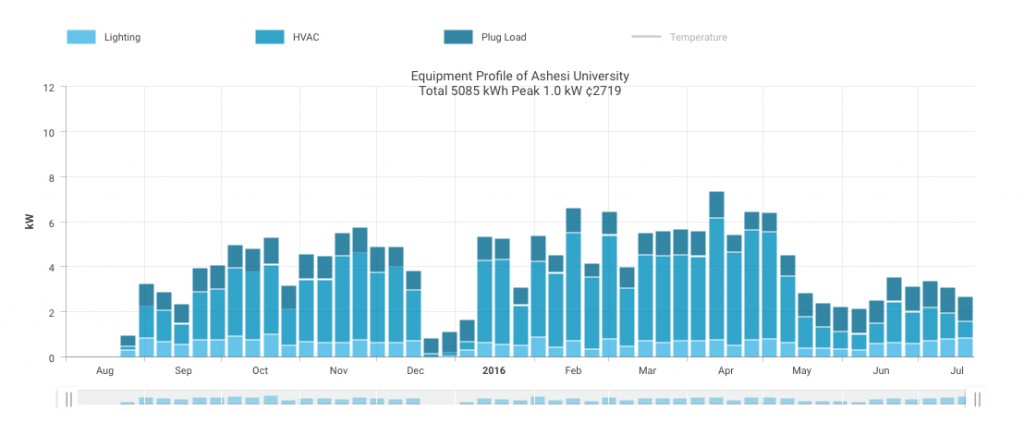
Orgone plans to advance the pilot into a permanent solar solution at Ashesi. Can you tell us more about this work?
Response by Kojo Asenso, Director of Operations
The pilot at Ashesi is the maiden phase of a program created by the Orgone Foundation aimed towards developing the future of reliable energy delivery and diversification in Ghana. The initial phase of the pilot will involve the installation of 22.5kW solar capacity and will take about 3 months to complete once construction starts. The proposed total capacity of 45kW will be completed in the subsequent 2 months after that with an incremental capacity of 11.25kW each month. With current electricity tariffs in Ghana at $0.19/kWh, this solar solution translates to an annual savings of $12,000 USD with savings potentially increasing to $13,000 USD per year after 6 years.
Future funding could also support a display screen for Ashesi to educate the community on energy usage in the library based on the installed system. Where would this funding come from?
Response by Columbia Business School Pangea Team (Christian Lopez, Andrew Soare, Jack Guevara and Matthew Levine)
There are multiple sources of funding that can support solar development. In the USA, tax incentive through the Investment Tax Credit (ITC) has driven a majority of solar growth. Though the Ghanaian government has shown interest and support for solar through net metering and exemption from tariffs for solar equipment, there is still some funding that is necessary to make solar economic or at least get people interested in a relatively unproven technology in Ghana. For the first pilot projects, we have received donations – both monetary and in-kind equipment – to get these projects started. As the social value of solar increases in Ghana through education and the cost of solar decreases, we will start to see more solar development that is commercially viable and does not rely on donations. In the US, we are already seeing utility scale solar even in places that have very efficient and cost effective power sources. In Ghana, it would be great to see solar become the major source of energy that can meet the growing, vibrant economy.
How do you imagine it would further help conserve energy?
Response by Columbia Business School Pangea Team (Christian Lopez, Andrew Soare, Jack Guevara and Matthew Levine)
Though significant, the energy savings from this project is a small factor in the total impact the Orgone project can have. The Volta River Authority has traditionally provided a majority of power for Ghana, but economic growth has created electricity demand that has subsequently been met with the burning of light crude oil. Renewable generation provides a clean, independent source of power that is very quickly becoming cost effective. It is important to spread this information and gain momentum in Ghana to understand the benefits that solar has and what better place to start than a university that has committed to addressing carbon emission issues through the establishment of the Ghana Climate Innovation Center (GCIC). The ultimate plan is to get a 45kW system in the ground as soon as possible. This will be a proof of concept not only for the energy savings but for the interaction students will have with the system. It will be a great hands-on addition to the energy curriculum. Eventually, we’d love Ashesi to be a net zero facility by either net metering and sending energy back on to the grid or using energy storage to displace old diesel generation sets when ‘Dumsor’ picks up. This could be a model facility that others can look at and can emulate.
Response by Shirley Blankson, Director of Capital Projects and Infrastructure Construction
With the completion of the solar solution coupled with the real-time energy usage monitoring system, we believe that we will be able to improve the reliability of electricity as well as minimize the carbon footprint of the university by reducing its reliance on diesel during power outages. This project may serve as a blue print solution to the unavailability of dependable electric service in the Sub-Saharan region of Africa.
 Orgone team visits Ashesi University to discuss the renewable energy project. From left to right: Vincent Ablordeppey (Orgone); Shirley Blankson (Orgone); Patrick Awuah (Ashesi University).
Orgone team visits Ashesi University to discuss the renewable energy project. From left to right: Vincent Ablordeppey (Orgone); Shirley Blankson (Orgone); Patrick Awuah (Ashesi University).
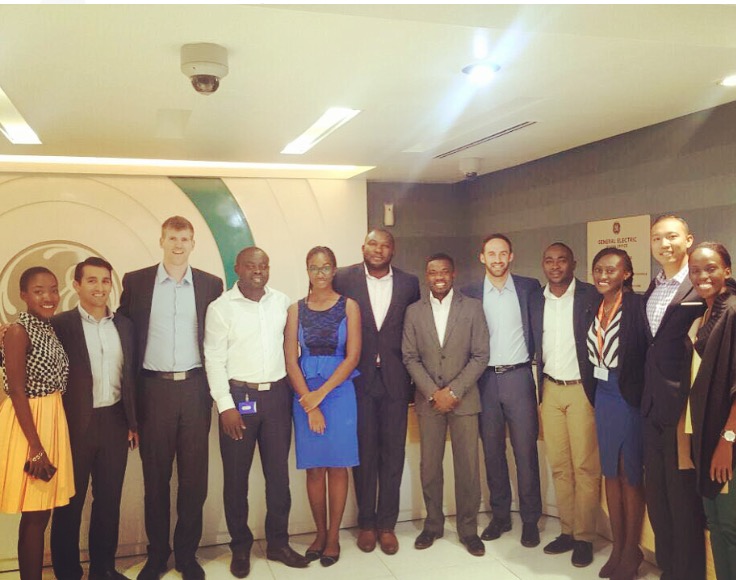 Orgone visits GE Ghana to discus ways to support the renewable energy solution at Ashesi University. Second from the left: Christian Lopez (CBS MBA Student); third from the left: Andrew Soare (CBS MBA Student); fifth from the left: Maame Efua Dadzie (Ashesi Student; intern at Orgone); second from the right Jack Guevara (CBS MBA Student); fourth from the right: Vincent Ablordeppey (Orgone); fifth from the right: Matthew Levine (CBS MBA Student); all others (GE Ghana).
Orgone visits GE Ghana to discus ways to support the renewable energy solution at Ashesi University. Second from the left: Christian Lopez (CBS MBA Student); third from the left: Andrew Soare (CBS MBA Student); fifth from the left: Maame Efua Dadzie (Ashesi Student; intern at Orgone); second from the right Jack Guevara (CBS MBA Student); fourth from the right: Vincent Ablordeppey (Orgone); fifth from the right: Matthew Levine (CBS MBA Student); all others (GE Ghana).
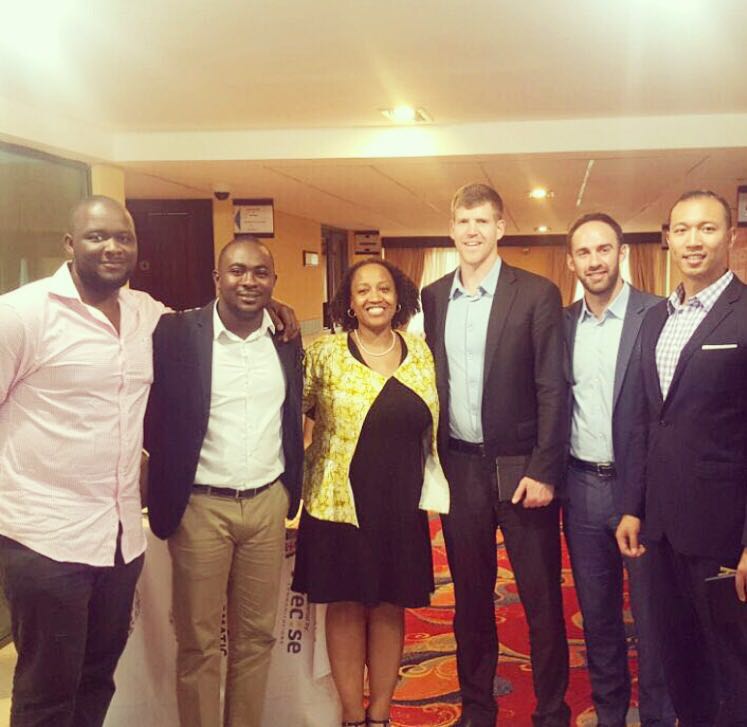 Orgone team meets with Ms. Deidra Fair James; the Resident Country Director of the Millennium Challenge Corporation for Ghana to discuss the energy efficiency and clean energy aspect of the Ghana Power Compact and how the Orgone Foundation can potentially support the MCC’s efforts using the Ashesi University project as a case in point. The Millennium Challenge Corporation (MCC) is an innovative and independent U.S. foreign aid agency that is helping lead the fight against global poverty. From the left: Kojo Asenso (Orgone); Vincent Ablordeppey (Orgone); Deidra Fair James (MCC); Andrew Soare (CBS MBA Student); Matthew Levine (CBS MBA Student) and Jack Guevara (CBS MBA Student).
Orgone team meets with Ms. Deidra Fair James; the Resident Country Director of the Millennium Challenge Corporation for Ghana to discuss the energy efficiency and clean energy aspect of the Ghana Power Compact and how the Orgone Foundation can potentially support the MCC’s efforts using the Ashesi University project as a case in point. The Millennium Challenge Corporation (MCC) is an innovative and independent U.S. foreign aid agency that is helping lead the fight against global poverty. From the left: Kojo Asenso (Orgone); Vincent Ablordeppey (Orgone); Deidra Fair James (MCC); Andrew Soare (CBS MBA Student); Matthew Levine (CBS MBA Student) and Jack Guevara (CBS MBA Student).
 The Orgone team meets with Mr. Kweku Awotwi (former CEO of VRA) to get his perspectives on how the Orgone Foundation’s project at Ashesi University can serve as a blueprint for others in Ghana. From left to right: Jack Guevara (CBS MBA Student); Christian Lopez (CBS MBA Student); Matthew Levine (CBS MBA Student); Kweku Awotwi (former CEO of VRA); Andrew Soare (CBS MBA Student); Maame Efua Dadzie (Ashesi Student; intern at Orgone); Kojo Asenso (Orgone) and Vincent Ablordeppey (Orgone).
The Orgone team meets with Mr. Kweku Awotwi (former CEO of VRA) to get his perspectives on how the Orgone Foundation’s project at Ashesi University can serve as a blueprint for others in Ghana. From left to right: Jack Guevara (CBS MBA Student); Christian Lopez (CBS MBA Student); Matthew Levine (CBS MBA Student); Kweku Awotwi (former CEO of VRA); Andrew Soare (CBS MBA Student); Maame Efua Dadzie (Ashesi Student; intern at Orgone); Kojo Asenso (Orgone) and Vincent Ablordeppey (Orgone).
Share this story

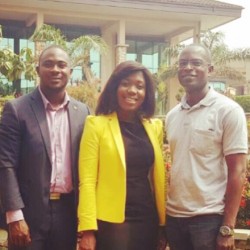
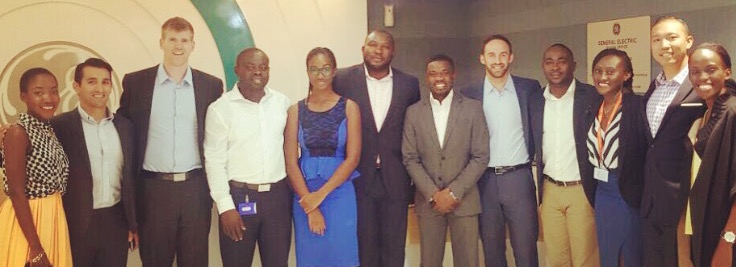
![Ashesi_Diagram1_Daily_Energy_Usage_Term1_v_Term2[1]](http://www.ashesi.org/wp-content/uploads/2016/07/Ashesi_Diagram1_Daily_Energy_Usage_Term1_v_Term21-1024x422.jpg)